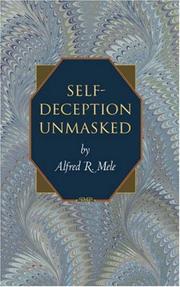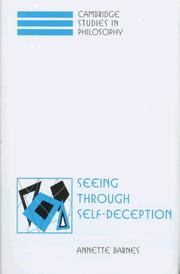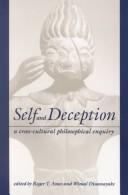| Listing 1 - 10 of 170 | << page >> |
Sort by
|
Book
ISBN: 1282869205 9786612869204 9956578010 9956616869 9956616818 9789956578016 9789956616817 9956616613 9789956616619 9789956616619 9781282869202 6612869208 9789956616862 Year: 2010 Publisher: Bamenda, Cameroon : Baltimore, Md. : Langaa Research & Publishing CIG, Project MUSE,
Abstract | Keywords | Export | Availability | Bookmark
 Loading...
Loading...Choose an application
- Reference Manager
- EndNote
- RefWorks (Direct export to RefWorks)
Every man lives for himself, using his freedoms to attain his personal aims, and feels with his whole being that he can at any moment perform or not perform this or that actionÖThe higher a man stands in the social scale, the more connections he has with others and the more power he has over them, the more conspicuous is the predestination and inevitability of every act he commits. Upon this philosophy, a former banker, Hansel Bolingo, suddenly finds [or makes] himself the regional representative of a Chinese firm that deals in crabs in Bangui. This catapults him into a position of instant wea
Book
ISBN: 1536128503 9781536128505 9781536128499 Year: 2017 Publisher: Hauppauge, New York
Abstract | Keywords | Export | Availability | Bookmark
 Loading...
Loading...Choose an application
- Reference Manager
- EndNote
- RefWorks (Direct export to RefWorks)
Book
ISBN: 1299104681 0226923754 9780226923758 9781299104686 9780226923741 0226923746 Year: 2013 Publisher: Chicago : University of Chicago Press,
Abstract | Keywords | Export | Availability | Bookmark
 Loading...
Loading...Choose an application
- Reference Manager
- EndNote
- RefWorks (Direct export to RefWorks)
During the late nineteenth and early twentieth centuries, Americans were fascinated with fraud. P. T. Barnum artfully exploited the American yen for deception, and even Mark Twain championed it, arguing that lying was virtuous insofar as it provided the glue for all interpersonal intercourse. But deception was not used solely to delight, and many fell prey to the schemes of con men and the wiles of spirit mediums. As a result, a number of experimental psychologists set themselves the task of identifying and eliminating the illusions engendered by modern, commercial life. By the 1920s, however, many of these same psychologists had come to depend on deliberate misdirection and deceitful stimuli to support their own experiments. The Science of Deception explores this paradox, weaving together the story of deception in American commercial culture with its growing use in the discipline of psychology. Michael Pettit reveals how deception came to be something that psychologists not only studied but also employed to establish their authority. They developed a host of tools-the lie detector, psychotherapy, an array of personality tests, and more-for making deception more transparent in the courts and elsewhere. Pettit's study illuminates the intimate connections between the scientific discipline and the marketplace during a crucial period in the development of market culture. With its broad research and engaging tales of treachery, The Science of Deception will appeal to scholars and general readers alike.
Deception. --- Psychology --- History.
Book
ISBN: 3957439639 9783957439635 9783897857735 3897857731 1336027096 Year: 2012 Publisher: Münster : Mentis.
Abstract | Keywords | Export | Availability | Bookmark
 Loading...
Loading...Choose an application
- Reference Manager
- EndNote
- RefWorks (Direct export to RefWorks)
Ein Leben ohne Hoffnung, so will es eine verbreitete Intuition, ist nicht lebenswert – wenn ein Leben ohne Hoffnung überhaupt möglich ist. Der landläufigen Ansicht nach ist Hoffnung ein Gut. Doch dass die Dinge nicht so einfach liegen, zeigt sich bereits an der ältesten abendländischen Geschichte zur Hoffnung, dem Pandoramythos bei Hesiod. Der Mythos stellt Hoffnung als Übel dar, als Teil einer Strafe, die Zeus den Menschen auferlegt. Diese Wertung der Hoffnung widerspricht der Intuition vieler Interpreten und war Anlass, den Mythos in verschiedenster Weise so zu interpretieren, dass Hoffnung nicht mehr als Übel dasteht. Hoffnung kann jedoch in vielerlei Weise defizitär sein. Wir sprechen etwa davon, dass Hoffnungen täuschen oder trügen. In harmlosen Fällen heißt das nicht mehr, als dass sich diese Hoffnungen nicht erfüllen und zu hoffen daher aussichtslos wäre. In weniger harmlosen Fällen wirft man dem Hoffenden vor, er müsste selbst wissen, dass seine Hoffnung sich nicht erfüllen werde, und habe sich nur durch seinen Wunsch, das Erhoffte möge eintreten, zu dem Glauben verführen lassen, es könne eintreten. Ein solcher Vorwurf ist keineswegs abseitig, Hoffnung steht in einem kontingenten, doch engen Zusammenhang mit Selbsttäuschung. Hoffnung beinhaltet einen Wunsch nach dem Erhofften und trägt damit die Motivation in sich, die Aussichten auf das Eintreten des Erhofften den eigenen Wünschen entsprechend einzuschätzen. Es ist dieser Zusammenhang, der Hesiod zu seinem harten Urteil über die Hoffnung gebracht haben könnte. Und es ist dieser Zusammenhang, dessen sorgfältiger Analyse dieses Buch gewidmet ist.
Hope. --- Self-deception. --- Deception --- Defense mechanisms (Psychology) --- Self-perception --- Emotions
Book
ISBN: 1299201431 0708325211 9780708325216 9780708325209 0708325203 9781299201439 9780708326442 0708326447 Year: 2012 Publisher: [Cathays], Cardiff : University of Wales Press,
Abstract | Keywords | Export | Availability | Bookmark
 Loading...
Loading...Choose an application
- Reference Manager
- EndNote
- RefWorks (Direct export to RefWorks)
The true, action-packed account of how a bogus Welsh nationalist infiltrated German Military Intelligence during the Second World War.

ISBN: 1283316897 9786613316899 1400823978 1400814464 9781400814466 9781400823970 0691057443 9780691057446 0691057451 9780691057453 Year: 2001 Publisher: Princeton, N.J. Princeton University Press
Abstract | Keywords | Export | Availability | Bookmark
 Loading...
Loading...Choose an application
- Reference Manager
- EndNote
- RefWorks (Direct export to RefWorks)
Self-deception raises complex questions about the nature of belief and the structure of the human mind. In this book, Alfred Mele addresses four of the most critical of these questions: What is it to deceive oneself? How do we deceive ourselves? Why do we deceive ourselves? Is self-deception really possible? Drawing on cutting-edge empirical research on everyday reasoning and biases, Mele takes issue with commonplace attempts to equate the processes of self-deception with those of stereotypical interpersonal deception. Such attempts, he demonstrates, are fundamentally misguided, particularly in the assumption that self-deception is intentional. In their place, Mele proposes a compelling, empirically informed account of the motivational causes of biased beliefs. At the heart of this theory is an appreciation of how emotion and motivation may, without our knowing it, bias our assessment of evidence for beliefs. Highlighting motivation and emotion, Mele develops a pair of approaches for explaining the two forms of self-deception: the "straight" form, in which we believe what we want to be true, and the "twisted" form, in which we believe what we wish to be false. Underlying Mele's work is an abiding interest in understanding and explaining the behavior of real human beings. The result is a comprehensive, elegant, empirically grounded theory of everyday self-deception that should engage philosophers and social scientists alike.
Self-deception. --- Deception --- Defense mechanisms (Psychology) --- Self-perception --- Self-deception --- Deception. --- Chicanery --- Deceit --- Subterfuge --- Truthfulness and falsehood --- Intrigue
Book
ISBN: 1682470296 Year: 2016 Publisher: Annapolis, Maryland : Naval Institute Press,
Abstract | Keywords | Export | Availability | Bookmark
 Loading...
Loading...Choose an application
- Reference Manager
- EndNote
- RefWorks (Direct export to RefWorks)
This title combines two of spymaster Barton Whaley's most potent analyses of the craft: Turnabout: Crafting the Double-Cross and When Deception Fails: The Theory of Outs. Each examination dives into extensive case studies to establish not only bedrock understandings of essential espionage principals, but also creates guidance for their practical application on both individual and governmental scales. Deception is a basic tactic used by allies and enemies alike, but when both protagonist and antagonist ply the same trade, it is the master of the double-cross who comes out the victor. Turnabout examines exactly how to turn the tables on an opponent and use their own deception against them. Through 38 case studies this monograph dissects the double-cross to reveal the psychological battle of wits at its core. No matter how well crafted, however, there is always a chance that a deception will fail. But failure is not the end of a deception, and even failed deception operations can yield results. When Deception Fails pores over 60 case studies to determine why a deception will fail, steps to prevent a failed operation, and how to turn that failure into a success. Through his analysis of the Theory of Outs, Whaley identifies the cunning required to recapture the initiative rather than allowing an error to turn an operation into a total loss.

ISBN: 0511583354 0511001894 9780511001895 0521620147 0521038774 Year: 1997 Publisher: Cambridge : Cambridge University Press,
Abstract | Keywords | Export | Availability | Bookmark
 Loading...
Loading...Choose an application
- Reference Manager
- EndNote
- RefWorks (Direct export to RefWorks)
What is it to deceive someone? And how is it possible to deceive oneself? Does self-deception require that people be taken in by a deceitful strategy that they know is deceitful? The literature is divided between those who argue that self-deception is intentional and those who argue that it is non-intentional. In this study, Annette Barnes offers a challenge to both the standard characterization of other-deception and characterizations of self-deception, examining the available explanations and exploring such questions as the self-deceiver's false consciousness, bias and the irrationality and objectionability of self-deception. She arrives at a non-intentional account of self-deception that is deeper and more complete than alternative non-intentional accounts and avoids the reduction of self-deceptive belief to wishful belief.
Self-deception. --- Deception --- Defense mechanisms (Psychology) --- Self-perception --- Self-deception --- Arts and Humanities --- Philosophy

ISBN: 0585067813 9780585067810 0791430316 0791430324 9780791430316 9780791430323 0791494721 Year: 1996 Publisher: Albany : State University of New York Press,
Abstract | Keywords | Export | Availability | Bookmark
 Loading...
Loading...Choose an application
- Reference Manager
- EndNote
- RefWorks (Direct export to RefWorks)
This volume contains essays by a range of distinguished philosophers on the problem of self-deception, or rather, self and deception. The work proceeds from the assumption that changing constructions of self within Western cultures, and alternative notions of self in other cultures requires that we rethink traditional strategies for explaining the phenomenon of self-deception. The concept of self is central to any sustained inquiry into self-deception, the pertinent issue being what sort of self is victim (or beneficiary) of self-deception. Several of the authors here base their thinking on the model of "other-deception," and include discussion of the notions of double selves, multiple selves, and subsystems of the self, to address this troubling problem. Other authors argue that "other-deception" is not an adequate or reliable model to guide our thinking on this issue. The psychological and moral dimensions of self-deception generate a rich discussion, as do its epistemic implications. The concept of emotionality also receives sustained attention.
Self-deception. --- Self-deception --- Philosophy --- Philosophy & Religion --- Speculative Philosophy --- Deception --- Defense mechanisms (Psychology) --- Self-perception
Book
ISBN: 1317488695 1315710358 1282947389 9786612947384 1844654206 9781317488699 9781844651511 1844651517 9781315710358 9781317488675 9781317488682 9781138175747 1317488687 Year: 2008 Publisher: Durham : Acumen Publishing,
Abstract | Keywords | Export | Availability | Bookmark
 Loading...
Loading...Choose an application
- Reference Manager
- EndNote
- RefWorks (Direct export to RefWorks)
Most of us think we are about 15 per cent cleverer, nicer, more attractive and better drivers than others think we are. It seems deception begins at home. After all the most convincing liars convince themselves first. Sellers and buyers, parents and children, friends and lovers must conceal from each other the unutterable truth that they dont believe or want the same things. In this book, Ziyad Marar throws a revealing light on the many ways deception is woven into the texture of human life: our wiring leaves us easily suckered by persuasive illusions, while our contradictory desires (for sex and honesty, money and kindness, for cake and losing weight) force us to cook up self-serving stories. We manage flattering impressions with effortless skill, while pretending our sins and self-indulgences are beyond our control. Drawing on insights from philosophy, psychology and literature Marar explores the implications for living well in the shadow of Kants humbling thought that out of the crooked timber of humanity, no straight thing was ever made.
Deception. --- Self-deception. --- Deception --- Defense mechanisms (Psychology) --- Self-perception --- Chicanery --- Deceit --- Subterfuge --- Truthfulness and falsehood --- Intrigue --- Philosophical anthropology --- General ethics
| Listing 1 - 10 of 170 | << page >> |
Sort by
|

 Search
Search Feedback
Feedback About
About Help
Help News
News